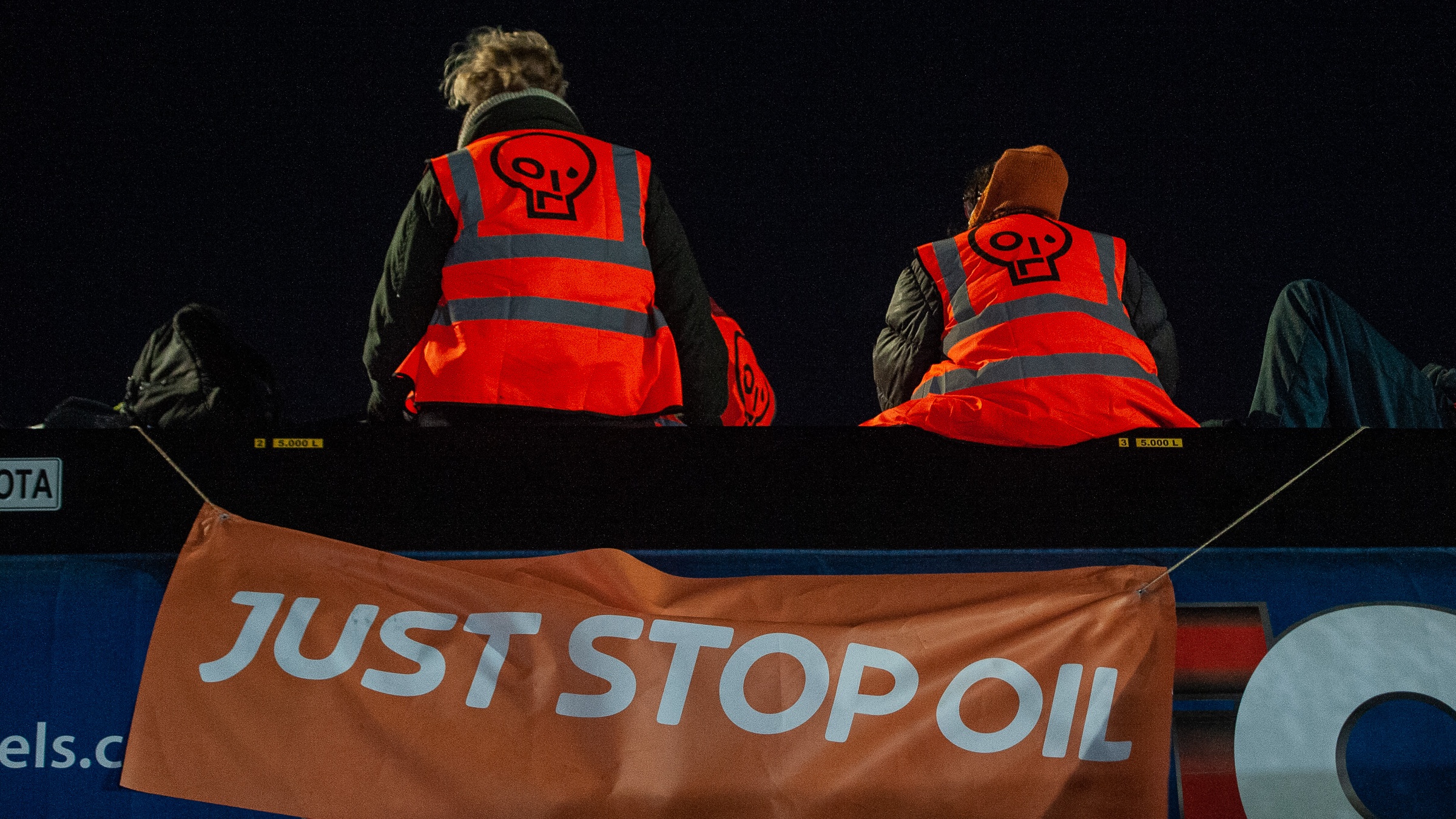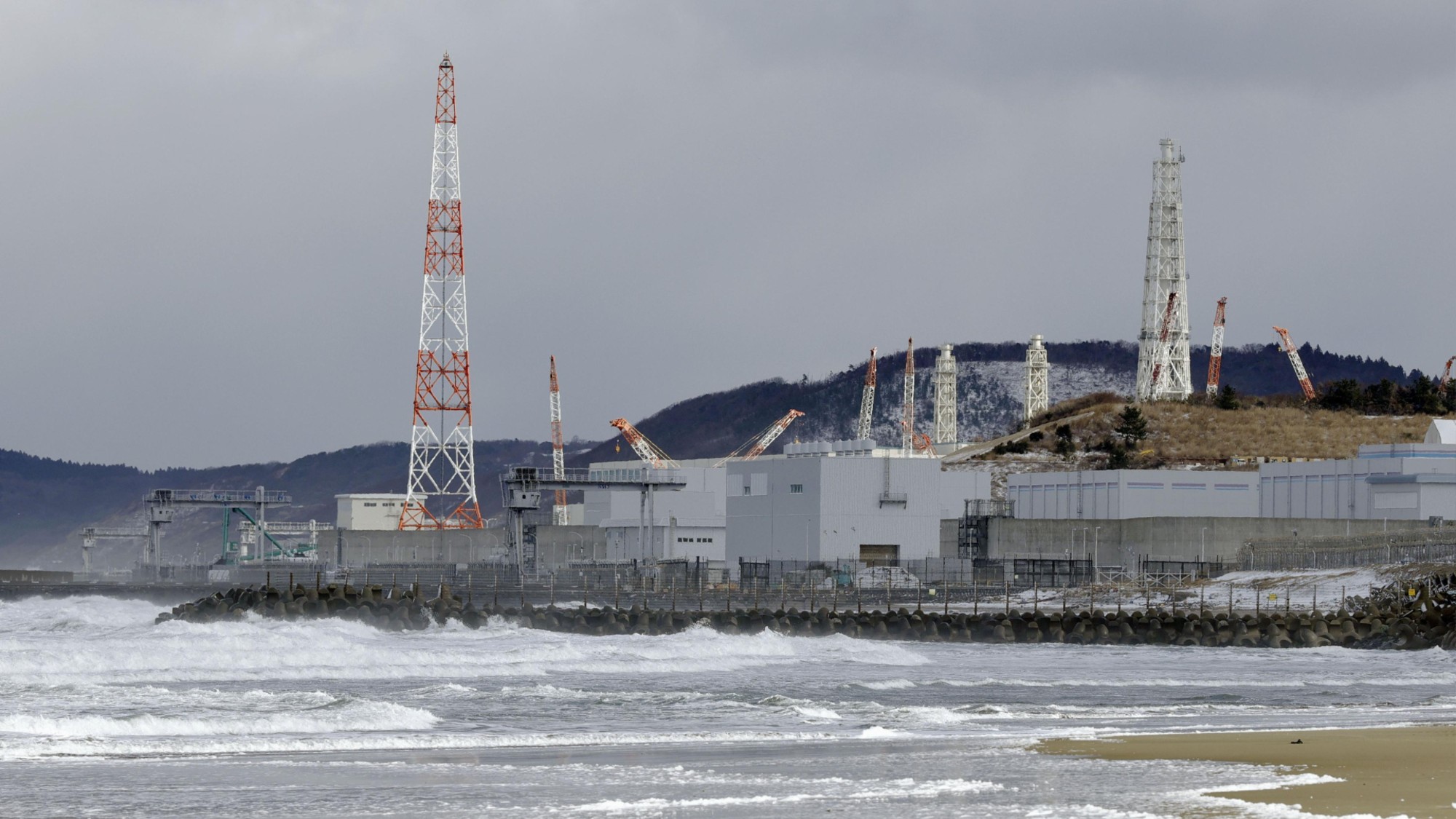Why Just Stop Oil finally stopped
Activist group said it's calling it a day after its demand became 'government policy'

Just Stop Oil is "hanging up the hi-vis" after "three years, thousands of arrests" and a "state crackdown on protest", said The Guardian.
The environmental campaign group said its "initial demand" to end new oil and gas is now "government policy", meaning it has been "one of the most successful civil resistance campaigns in recent history". It added that it will cease direct action, following a final protest in Parliament Square on 26 April.
Just Stop Oil was a youth-led offshoot of Extinction Rebellion and other climate protest organisations. It emerged in February 2022, and called for the UK government to halt all new fossil fuel projects to combat climate change.
The Week
Escape your echo chamber. Get the facts behind the news, plus analysis from multiple perspectives.

Sign up for The Week's Free Newsletters
From our morning news briefing to a weekly Good News Newsletter, get the best of The Week delivered directly to your inbox.
From our morning news briefing to a weekly Good News Newsletter, get the best of The Week delivered directly to your inbox.
One activist described the group to The Observer as "a non-hierarchical coalition of organisers, scientists, lawyers and former workers in the oil industry who collaborate on both demands and tactics".
Members operated in "autonomous blocs with shared resources" but there was no formal leadership, with the majority of the group's funding coming from donations.
It believed that transitioning away from fossil fuels would "help cut energy bills and help us meet our international climate obligations", said London's The Standard. "Allowing the extraction of new oil and gas resources in the UK is an obscene, genocidal policy that will kill our children and condemn humanity to oblivion. It just has to stop."
There has been "perhaps no more polarising" climate group, said The Guardian. The tactics of "blocking roads, halting sports events" and "targeting national treasures" angered "politicians, pundits" and much of the public.
A free daily email with the biggest news stories of the day – and the best features from TheWeek.com
Aims
Its aims broadly fitted with the International Energy Agency's call for "no new investments in oil, gas and coal", said the Financial Times. But its "non-violent stunts" relied on a "committed, coordinated hardcore", with donors including the Climate Emergency Fund, "a non-profit backed by oil heiress Aileen Getty".
The goal was to raise awareness of the effects the oil industry has on climate change "on a massive scale". One activist told The Guardian the group was able to mobilise "upwards of 1,000 people" and employed tactics that are a "fusion of other large-scale blockade-style actions you have seen in the past".
As the name suggested, the group demanded an immediate end to all new fossil fuel supply projects and urged the government to "make a statement that it will immediately halt all future licensing and consents for the exploration, development and production of fossil fuels in the UK".
Group tactics
The strategy included "gluing themselves to the road and attaching themselves to fuel tankers with bike locks", said Sky News. Activists began targeting art galleries, throwing soup at Vincent van Gogh’s "Sunflowers" and gluing themselves to a John Constable painting in London’s National Gallery in 2022.
Supporters of the group began blocking roads and bridges across London, causing severe disruption by obstructing the M25, the country’s busiest motorway.
Another "popular method of protest" was for members to tie themselves to goalposts at Premier League football matches, said the Daily Mail, with one protester tying himself to a post by his neck.
They caused "chaos" at the 2022 British Grand Prix, said The Telegraph's chief sports writer, Oliver Brown, invading the Silverstone track on the opening lap, "risking death both to themselves and the drivers".
"What's striking," said the FT, is that protesters' tactics were "milder than those used by the suffragettes". But like the suffragettes in their time, "climate protesters are not loved" by the British public.
YouGov survey results published in 2023 indicated that 36% of UK adults had a "very unfavourable view" of Just Stop Oil, compared with 12% somewhat favourable and only 4% very favourable.
The previous year, the group released the results of a YouGov survey commissioned by Social Change Lab saying that more than half (58%) of UK adults supported a ban on new oil and gas projects. But more recent polling showed nearly three-quarters of the public thought protests rarely, if ever, made a difference.
Response
A myriad of legal measures was introduced with the aim of curbing public protest. The Police, Crime, Sentencing and Courts Act 2022, which came into effect in 2023, gives police the right to restrict protests if they believe one could cause public disorder.
The police said they needed more powers and "they got them", said the BBC – a raft of offences was created including interfering with national infrastructure, tunnelling underground and so-called "locking on" – chaining or gluing yourself to something.
Activists have also faced tough prison sentences. The M25 protesters received the longest jail terms for non-violent civil disobedience ever issued.
Although the group has claimed victory, the government "strongly denies" its policies have a link to Just Stop Oil's protests, said the broadcaster, and the group's wider goal, to "end the production of oil and gas", has "manifestly not been achieved".
What will happen next?
Announcing that it plans to stop direct action, the group said it was not the "end of civil resistance" because "governments everywhere" are "retreating" from doing what's necessary to "protect us" from the "consequences of unchecked fossil fuel burning".
Just Stop Oil is "creating a new strategy", the group said to "face this reality" and "carry our responsibilities at this time".
The BBC noted a possible "hint" that the group's new focus "might be on the political system itself", when Roger Hallam, one of the five activists convicted for its role in the M25 protests, said that the group has only had a "marginal impact", because of the failure of political leaders.
-
 Did Alex Pretti’s killing open a GOP rift on guns?
Did Alex Pretti’s killing open a GOP rift on guns?Talking Points Second Amendment groups push back on the White House narrative
-
 The 8 best hospital dramas of all time
The 8 best hospital dramas of all timethe week recommends From wartime period pieces to of-the-moment procedurals, audiences never tire of watching doctors and nurses do their lifesaving thing
-
 ‘Implementing strengthened provisions help advance aviation safety’
‘Implementing strengthened provisions help advance aviation safety’Instant Opinion Opinion, comment and editorials of the day
-
 The world is entering an ‘era of water bankruptcy’
The world is entering an ‘era of water bankruptcy’The explainer Water might soon be more valuable than gold
-
 Fifteen years after Fukushima, is Japan right to restart its reactors?
Fifteen years after Fukushima, is Japan right to restart its reactors?Today’s Big Question Balancing safety fears against energy needs
-
 Climate change could lead to a reptile ‘sexpocalypse’
Climate change could lead to a reptile ‘sexpocalypse’Under the radar The gender gap has hit the animal kingdom
-
 The former largest iceberg is turning blue. It’s a bad sign.
The former largest iceberg is turning blue. It’s a bad sign.Under the radar It is quickly melting away
-
 How drones detected a deadly threat to Arctic whales
How drones detected a deadly threat to Arctic whalesUnder the radar Monitoring the sea in the air
-
 ‘Jumping genes’: how polar bears are rewiring their DNA to survive the warming Arctic
‘Jumping genes’: how polar bears are rewiring their DNA to survive the warming ArcticUnder the radar The species is adapting to warmer temperatures
-
 Environment breakthroughs of 2025
Environment breakthroughs of 2025In Depth Progress was made this year on carbon dioxide tracking, food waste upcycling, sodium batteries, microplastic monitoring and green concrete
-
 Crest falling: Mount Rainier and 4 other mountains are losing height
Crest falling: Mount Rainier and 4 other mountains are losing heightUnder the radar Its peak elevation is approximately 20 feet lower than it once was